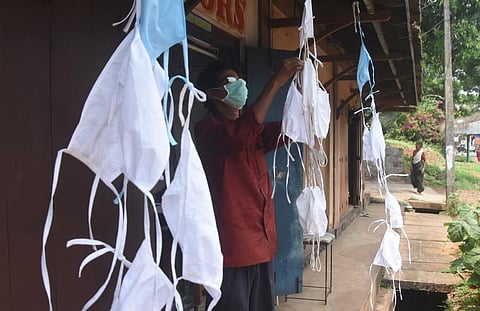

BENGALURU: A group of scientists from Bengaluru-based Centre for Nano and Soft Matter Sciences (CeNS) under the Department of Science and Technology (DST) have proposed using static electricity (Triboelectricity) to make COVID-19 masks more effective.
One of the researchers told TNIE that as a virus has a negative-charge surface, and as the outer layer of the mask also gets negatively charged, the virus repels.
One has to vigorously rub the mask, made out of non-woven polypropylene cloth (a material used often as grocery store bags), with nylon or silk or wool cloth to create the electrostatic energy.
However, this proposal is based on theories and are yet to be tested in laboratories.
The team of Dr Pralay Santra, Dr Ashutosh Singh, and Prof Giridhar U Kulkarni from CeNS has developed a simple three-layered face mask that holds electric charges to restrict the entry of infections.
It uses no external electricity and is called ‘Tribo E mask’ (derived from Triboelectricity).
It can be stitched at home with just a nylon/silk/woollen cloth placed between polypropylene layers.
The outer layer of the three-layered mask, when rubbed together, develops negative charge while nylon holds a positive charge, say the researchers, thereby creating double-electric-wall protection against viruses.
The cloth mask is washable. It reduces dependence on surgical and other technical quality masks. The mask is expected to reduce transmission of micro-droplets that linger in the air, the researchers explained.